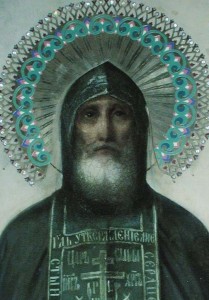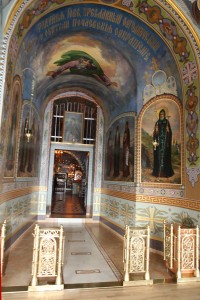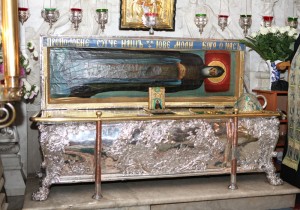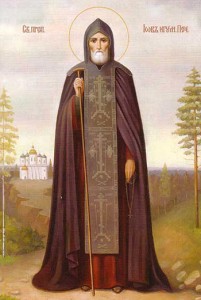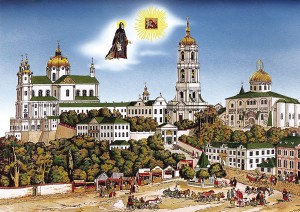Venerable Iov (or Job) – the abbot (“hegumen”) of Pochaev Lavra (around 1551- †28 of October 1651), a prominent Saint of Russian and Universal Orthodox Church, who conducted the life of great piety and strict asceticism, – was born in Galicia and during his century-long life was an ardent defender of the Orthodox Faith from the heretic distortions of Roman and Union Catholicism, widely spread in that part of Poland.
“Being the blessing Light of Galician land…” The place of birth and childhood plays a predominant role in the life of any person… The first years spent in the parents’ house, even if they were not numerous, have a great influence on the formation of the whole moral image of a character and its pious inclinations…
The first biographer of Saint Iov-his spiritual disciple and successor-abbot (“hegumen”) of Pochaev Lavra-Father Dosiphey – informs us that the future Venerable Iov was born in 1551 in Prykarpattya Rus, in the region of Pokuttya that lies between the Carpathian Mountains and The Dniester River. This land had always been populated with the pious Russin and Huzul people.
“A holy branch of the virtuous root…”
The names of Venerable Iov’s parents’ were Ioann (John) and Agaphia (Agate). These names, as well as the names of his other relatives, are written “forever” in the special books of Pochaev Lavra for being daily mentioned by the clergy in every Prothesis (The Liturgy of Preparation, or “Proskomedia”) and in every Memorial service (or “parastas”, “panikhida”). The parents of Venerable Iov were, probably, of noble, “szlachta” origin – for at that time only the representatives of the noble and rich families possessed, beside their first name, a certain “nickname” which corresponds to the contemporary last name or a surname. Being well educated themselves, pious John and Agate taught their son Old-Russian and Slavic languages and Church literature, thus providing him with foundation for the Christian Orthodox Faith and true patriotism. At his parents’ house he already started to read the Holy Scriptures, Slavonic Liturgical texts, some particular works on ascetic life of the Holy Fathers and other examples of the Patristic literature. According to one of the XIX century researchers of the life of Venerable Iov, archpriest father A. Khoynatsky, Saint Iov was the descendant of those Russian-Galician residents “for whom the Orthodox Faith and the Russian nationality were the most precious possession, and who, being themselves the fervent guardians of their ancestors’ customs, were able to instil the same feelings and aspirations in their heirs…”
In the accomplishments of a monk or a nun there is always a part of the achievements of his or her parents: their faith, family piety (“philokalia”) and sacrificing their child to the service of God… In Old Holy Rus, as well as in the whole Orthodox world, there has always been a custom to let some children of the family become monks or nuns: they are expected then to pray for all previous and future generations of their relatives… Many pious parents prepared their children for the monkhood from the juvenile age. Such practice existed not only among peasants, but also among noble families.
“Implications of the name revealed by corresponding life…”
In the year 1628 the Metropolitan of Kiev- Most Reverend Iov (Boretsky)- called the Orthodox Council (Synod) , in which “hieromonk Ioann (John) Zhelezo, the abbot (“hegumen”) of Pochaev Monastery,” took part. This event gives us an exceptional opportunity to know what the real last name of Venerable Iov was. The Kiev Synod denounced uniate views of Bishop Meletius (Smotrytsky) of Polotsk. The Fathers of the Council proclaimed and promised that they would strictly adhere to the Orthodoxy and combat with the Union of Brest, calling for that struggle all truly Orthodox people. Venerable Iov Zhelezo (which literary means “Iron”) put his name under this decision as well…
It is interesting that Venerable Iov totally confirmed his last name “Zhelezo”( which sounds like “Zalizo” in the contemporary Ukrainian and translates as “Iron” or “Iron like”) by his resoluteness in professing the Orthodox Faith, by his steadiness in making good deeds and his diligence in loving God, which were his characteristic qualities from the early years! He was “Iron like” in spirit all his life! About this his Relics also manifest: for, after his blessed repose and according to the Divine Will of God, they are still preserved and not touched by decay… “One can kiss His imperishable hand… It is warm, and if you get scared, it is not because you are touching a corpse of a dead man, but because you are sinful, and Venerable Iov is a Saint…”
In the Cavern Church founded in his honor in the Dormition of Mother of God Pochaev Lavra, right above the cave where his Holy Relics repose, there is a painted Image of Venerable Iov. A poetic inscription (verses) of 8 lines under this icon explains the reason why the Saint does not decay: “Pray Thee, tell me, why this Man is not devoured by rot? – Because he was uttered a Man of Iron… In monkhood Iov, in scheme Ioann (John) used to be called…”. On the icon Venerable Iov holds a scroll with the verses from the 15th Psalm: “You will not abandon my soul in hell, and will not let the Saint of Yours face decay…” (Psalm 15, 10).
“He is very strong, the Venerable Iov Zalizo… Demons know that very well, – says a popular contemporary spiritual writer archpriest Andrey Tkachev. – Several times a year when the Saint abbot (“hegumen”) leaves the place of His repose and on the shoulders of the clergy during the great Church Feasts moves in the Cross Procession around his monastery, the armies of demons are crying desperately for many miles around…”
The future Venerable Iov was christened right after his birth and called Ioann (John), in honor of Ioann (John) the Prophet, the Predecessor and the Baptist of Jesus Christ. Probably, the parents also had chosen this name as the one venerated in the family, because, Saint Iov’s father’s name was also Ioann (John). Besides, in the old times there existed a tradition in the Orthodox families to baptize the baby in the name of the Saint that was honoured on the day of the child’s birth… In this way the name of a man was not determined by the sinful human will, but predestined by the Will of God. From the ancient times Saint anchorite Ioann (John) the Baptist, in Whose honor was christened the future Venerable Iov, due to his strict ascetic life, has been considered by many representatives of the eastern monkhood as one (and maybe the first) of the forefathers of the monasticism … Saint Iov’s parents’ choice of the name and of the Divine Protector for their son resulted, in its turn, in his own inclination to a certain life path and the method of serving the Church and its people…
The Man of Ascetic life from the early youth.
From the early years juvenile Ioann (John) demonstrated aspiration towards secluded life of a hermit, towards praying…Maybe, by the virtue of his parents’ prayers and their love to God, he became a monk. Such vital choice many Holy Fathers of the Church trust to be predestined from above: as if Ioann had already been born a monk, living as “the Angel of God” in the house of his parents, and later on – among the brothers of the monastery… He was not even 10 years old, when he left his house, and “avoiding the eyes of his beloved parents,” departed for the near-by Ugornitsky Monastery of Transfiguration of Our Saviour, where he pleaded the permission to serve the brother monks… According to the proper understanding of the Words of Our Lord Jesus Christ, written in the Gospels, the young John (Ioann) did not “conceive hatred” neither against his father, nor against his mother ( Luke 14:26), but against everything that prevents human soul from salvation and destroys communication between the God and the man. In other words, he was trying not to love his parents more than he loved God…That was also the reason why the future Venerable Iov (as it is said in His Akafist) “being extremely young, left the house of his parents” (Ikos 1)… Monkhood – is when someone sacrifices himself entirely for God’s sake…To be ready for self-sacrifice is very important and it pays back enormously! Our Lord Jesus Christ once said that “everybody who leaves his house, or his brothers, or his sisters, or his father, or his mother, or his wife, or his children, or his possessions in My Name, will receive 100 times more and inherit the Eternal Life” (Math. 19:29).
The Monastery of Transfiguration of Our Saviour situated near Ugorniky village was founded around the year 1280 by the monks of Kiev-Pechersk Monastery (Kiev Caves Monastery) that was destroyed at that time by the Mongol –Tatar troops of khan Batiy. The small provincial monastery, founded by the Kiev friars, had existed till the year 1812 and became well-known, leaving its footprint in history, only because of the future famous Saint, Venerable Iov, who once was living there as a novice and later received the monkhood tonsure from its abbot (“hegumen”)… Young Ioann (John) was growing under the protective cover of the Holy prayers that the brethren of this monastery were exalting to God… The time when he had an opportunity to dive deeply into the sacred atmosphere of the uninterrupted monastic and ascetic tradition (which is only inherited by one generation of monks from the other), was a God’s Blessing for him…The communication with the zealous friars and hermits of the monastery was of huge importance for the future Saint… Young Ioann (John) saw the God-bearing brethren, he listened to their conversations and was eager to absorb their teachings…Their advice and counselling helped him, in the first place, to choose the right path of life… The Holy Fathers’ famous saying insists that “Nobody becomes a monk before seeing on the face of another monk the reflection of the Eternal Light…” Such spiritual radiance was emitted from the brethren of the Ugornitsky Monastery; this Devine Light was surrounding the life of the parents of the future hegumen (abbot) of Pochaev Lavra… The spiritually wise prior of the Ugornitsky monastery saw that the young Ioann was chosen by God (for the Holiness was already reposing on that boy), and gladly blessed him to join their brotherhood.
By entering the monastery young Ioann started a completely new life: according to the old monastic rules, initially he became a novice. The Russian term “poslushnik” (“novice”) – comes from the word “poslushanie” (“obedience”). It means that a person is being on trial; and he also tries his own strength… The other monks look at him and test whether he will be able to live in the monastery and conduct a rather secluded type of life. Being known as coming from a very pious family, young Ioann was given “poslushanie” (a “task”) to help the elder sexton in the church. He, possibly, was helping in the Altar during the Services, as well as supervising all the church properties: he lightened the candles at the beginning and put them out at the end of the Liturgies and Vigil Vespers, helped to bake “prosphoras” (unleavened bread), brought to the Altar wine and water, prepared the thurible and the enlightened coal for the priests. He also was in charge of cleaning in the Altar and in the church. With time, he might have been given the duty of reading the Canonical Hours and singing in the church choir or ringing the bells. It is also possible that, according to the monastery customs, Ioann (John), as a novice, had to work for some time in the kitchen or in the refectory. The novice Ioann was, undoubtedly, glad that the time came to use those lessons of the pious life that he received once by reading spiritual literature. Young Ioann by trying “to please and serve every of the smallest monastery servants as if he was serving Christ Himself,” soon attained general affection and love. As a result, the young novice and his spiritual Father-prior understood that the monastic life is Ioann’s destiny and his path to God… Truly, as the Church texts say, Venerable Iov at the beginning of his monastic life was “young by his flesh, but already old in his mind,” while at the end of his life, “being aged in flesh, [he] demonstrated the juvenile agility in work, and gave everybody the example of wise meekness by digging the soil and planting the trees…”( the 2nd troparion of the 8th song of the Canon of the Vigil Service to the Saint).
The newcomer probation period that normally lasts 3 years, was shortened for Ioann Zhelezo as for the person particularly inclined to the monastic life…The abbot, “seeing a good disposition of the novice, as well as his meekness and deep humility” was glad and confident in the before made decision to accept him as a brother of the monastery…As it is said in the special Service – “Akafist”- to the Saint Iov, “… even the old monks [that themselves had well thrived in the monastic exploits] marveled at the ascetic life of such a young boy…” (Akafist to Saint Iov, Icos 1). Soon – on his twelfth year of life – the ardent novice Ioann was tonsured into monkhood by the hegumen of the Ugornitsky monastery…
While being tonsured into the Lesser Schema, he received a new name – Iov – in honour of the Forefather Righteous Iov the Long-Suffering (commemorated on the 19th of May according to the new style calendar). The different name that is given to the monk, demonstrates that joining monkhood is, first of all, “self-rejection.”
“A zealous life in honour of God…”
The life of Venerable Iov, after he became a monk, was so clear and irreproachable – in spite of all the heaviness of the ascetic exploits- that father Dosiphey in the biography compares him to an Angel: “He was an adept monk, adorned not by the years, but by his virtues, living among the brothers of the monastery as an Angel…and every day growing to be more pious and holier…” Thus, in spite of his young age, Venerable Iov succeeded in becoming an example for his brothers-monks: they better perceived their own merits and deficiencies through comparing them to his behaviour, or, as Father Dosiphey put it, Saint Iov “was for everybody a reproach and a benefit…”
After reaching the canonical priesthood age of 30 (probably, in the year 1581) – and after many spiritual achievements, as it is said in his biography, – the monk Iov was ordained, firstly, a deacon, and then a priest…It is also very possible that being very meek, he did not consider himself as deserving to become a clergyman, and received the Holy Dignity only out of obedience…Soon after that, according to the monastic tradition of the Mount Athos, Venerable Iov was consecrated into the Great Schema. This time his first name Ioann- in honour of Saint Ioann the Baptist and Predecessor – was returned back to him. But in the history of the Russian Orthodox Church, in Menologium (The Church monthly book of all Services) and in the people’s memory he has always been remembered and worshiped as Venerable Iov, for, as his biography tells us, “…not only by his name, but virtually [by practicing strict ascetic exploits] our blessed Father Iov resembled multi-dolorous Iov from the Old Testament…” In his life – as the troparion states- he succeeded to unify “the patient endurance of the Long-suffering Forefather” and “the abstinence of the Baptist…”
The ascetic life and spiritual virtues of the young Ugornitsky monk soon became widely known and admired in the whole region of Galicia and Volhynia. Many people were coming to the monastery in order to see the Venerable Father and to receive from him an advice or teaching for their spiritual well-being, as well as to ask for his blessing and prayers…Among the visitors there were simple and noble people, poor and “ostentatiously rich,” which all appealed to the Revered Father, seeking the “salvation for their souls…” The Venerable Iov did not reject anybody, and taught them by his own example of elevated piety…The good fame of the Galician zealot reached Prince Basil-Constantine of Ostrozhsh who was assembling around himself at that time all the theological and ecclesiastical forces of that land. His aim was to strengthen the Eastern Orthodox Church persecuted by the Roman catholicism and to protect the Orthodox Rusin population of the Polish-Lithuanian Commonwealth.
Prince Constantine asked the abbot of Ugornitsky monastery to send “the pious and assiduous”30-years old Iov to one of the convents belonged to the family of the Ostrozhsh Princes in Volhynia. This Monastery of Resurrection of the Holy Cross in Dubno was known from the year 1547… As a result of this Prince’s entreat, Venerable Iov arrived to the new place “for demonstrating – as the Prince formulated in his imploration, – the example of ascetic exploits to the brethren of that monastery…” It is also possible that Venerable Iov was supposed to introduce a new Coenobitic Statute in the abbey of the Resurrection of the Cross. Soon after his arrival, the monks of Dubno convent chose him to be their head (“hegumen”), which task he had been zealousl performing for twenty years… Saint Iov taught his monastic brothers through strengthening oral exhortations by his own vivid example…As well as his patron Prince Constantine of Ostrozhsh, Venerable Iov was taking a special care of dissemination of spiritual Orthodox and Church books. The friars of Dubno monastery were also translating the important texts written by Holy Fathers into Old-Slavonic language… As it is said in his biography, [while living] in Dubno, Saint Iov “was exercising in writing Church books…”
At the beginning of the 17th century (in the year 1604), Venerable Iov left the convent in Dubno and settled on the Pochaev mountain. What was the reason of his decision – we can only guess…It is very probable that the vain glory of this world embarrassed the Saint…As his biographer, Father Dosiphey, writes: [soon] “all nearby lands started, gathering together, to serve him by honouring and praising…” But the Saint, being strict, first of all, towards himself, and possessing from the early youth the spirit of humbleness and self-effacement, did not like the recognition of the world and considered it a burden, for “he wanted to be praised and glorified not by people, but only by All Secrets-Seer God.” He wanted to conduct the secluded life of a hermit: not as an abbot, but as a simple monk…Having left the position of the head of the monastery in Dubno, Venerable Iov came to the mount of Pochaev and there “instead of commanding, chose again to be obedient to the orders of others”(Akafist, Ikos 2).
The several monks living then on the Pochaev mountain did not even have a “hegumen” (an abbot)…The only possession of the monastery was an old decrepit wooden Temple, built by the friars of the preceding times…The brothers asked Reverend Iov to accept the leadership (for reviving the monastery), and he, being very humble and dutiful, complied…Having a considerable experience in management, he was able to organize in Pochaev – after the example of many other Russian convents – a coenobitic monastery, that was functioning according to the rules of Basil (Vasiliy) the Great and the Statute of Theodor the Studite … Actually, Venerable Iov became the first abbot (“hegumen”) of the Pochaev Mountain…
In the new place he soon had to encounter great difficulties… After the death of the first benefactor of the
convent-the local landowner Anna Goiskaya her grandson and heir – Andrew Firley, who was a protestant, sent his servants to the Pochaev Monastery in order to plunder it… The villains ripped the monastery off the sacred Icon
and off all the church valuables…Later on, as the story tells, the wife of Andrew Firley defiled the Sacred Icon of Our Mother of God and many other Holy monastery belongings, and was punished for this act by illness… Her husband, being frightened, hastened to return to the convent its pillaged properties …
Venerable Iov did not only win in those conflicts: he succeeded in extending considerably the territories of the monastery… With time he had found a few rich Rusin landowners, who were willing to donate for the needs of the monastery… It is especially important to mention among those ones Theodor and Eva Domashevsky, who provided the convent with large sums of money…
Using those resources the monastery in 1649 was able to build a new Holy-Trinity Church, where the Pochaev Miraculous Icon of the Mother of God was placed… Later on the convent was surrounded by the stone wall, and six smaller churches within it were constructed as well…
In 1618 Reverend Iov also actively participated in the foundation of the Pochaev publishing house, which (if to overlook a little break) had been existing more than 180 years – till the year 1918…
Reverend Iov continued fervently to work, to preach and to write in order to defend Orthodoxy. Till the 30s of the XX century there was kept in Pochaev Lavra one of his books, titled “The Book of Iov Zhelezo, the abbot (“hegumen”) of Pochev Monastery, written by his own imperious hand…” In 1889 this book was for the first time published in Russian in the Lavra printing house and named “The Bee of Pochaev.”
The zealous servant of God lived on this earth 100 years, from which 90 years he was a monk! The Pochaev Mountain had not seen such an abbot (“hegumen”) before or after him! However, nowadays he is still being an Abbot (“Hegumen”) of his Monastery, and it is still possible to ask and receive a blessing from him!!!
Worshipping of the Venerable Iov by Rusin population…
The Relics of Saint Iov were staying buried under the ground for 7 years and 9 months. Though, in fact, he buried himself alive, as in a grave, from the passions and vanity of this world in that confined cave of the Pochaev Mountain, where he was conducting a strictly ascetic life during the last years of his time on earth… His glorification among the Saints and finding of his Relics untouched by decay took place in 1659 – after his triple apparition to the Metropolitan of Kiev Dionysius (Balaban)…
Soon after the Acquisition of the Relics (only two and a half weeks later) – there came to Pochaev Lavra a rich and noble pilgrim Eva Domashevskaya for celebrating the Feast of Resurrection of the Cross. In the middle of the night she heard singing and saw that light was shining in the Holy Trinity Church…
She sent her maiden Anna to find out what Service was being held there, and the servant girl was extremely surprised to see the Church doors wide open. Inside it, in the middle of the Temple, Saint Iov, clothed in very bright apparel, was standing between the two Angels and praying to God…He addressed the girl and gave her the boards soaked with Holly Myrrh for the abbot (“hegumen”) Dosiphey (at that time hopelessly sick). The first biographer of Saint Iov and his student received those boards and, after having anointed himself with it, was miraculously healed…
On the 17th of June, 1833, the Volhynia-Zhitomir Bishop Innokenty (Selnokrinov) established the local Feast of Commemoration of the Finding of the Holy Relics of Venerable Iov of Pochaev. On the 28th of August, 1833, the non-decayed body of the Saint was gloriously re-displayed for the general veneration for the second time – 177 years after the acquisition and right after a long period when the Relics were hid from the faithful Orthodox people by the followers of the Catholic Union…
In 1902 the Holy Synod of the Russian Orthodox Church prescribed that every year on that Day right after the Divine Liturgy the Holy Relics are to be taken and brought in Procession around the Dormition Temple of Lavra…Since that time the Feast in honor of Venerable Iov on the 10th of September (according to the new style), became the main Feast of Pochaev Lavra.
The fervent protector of the Orthodox Faith in the hard time of The Union of Brest and the Polish-catholic dominion in Western Russia, Saint Iov by his highly ascetic life and strength of faith verified his family last name – Zhelezo. A tireless combatant with the Union of Brest and Latinism, a fellow-campaigner of Bohdan Khmelnitsky in his struggle for the Orthodox Faith and Russianness, the enlightener of our people through printing Orthodox Church books – Venerable Iov demonstrated in his character a rare combination of an active cultural and political figure and a hermit… This famous hegumen-administrator and hesychast-recluse made the Pochaev Monastery recognized and distinguished worldwide … As the first and very active abbot of the convent, he played an immense role in its construction and strengthening: he was its head for 50 years-exactly half of his century-long life – till his blessed death! Without him The Pochaev Lavra wouldn’t become that Holy place which it is being now… There are no enemies that can defeat Lavra: and this is only because of its Saint’s prayers to God! His Holy Relics – not touched by decay- are being the greatest shrine of the Pochaev monastery and of the whole Orthodox population of the Western-Russian region…
Thanks to the monastic exploits and prayers of Venerable Iov the process of returning of the Volhynia Uniates to the Orthodoxy at the end of the 18th century went quickly and flawlessly… For those Rusins, who lived in Galicia, the life of their Saint countryman was an example, and for celebrating the great Church Feasts they formed multiple Cross Processions and headed over the Austrian border to the Pochaev Lavra for praying and worshiping its Holy Shrines…
After having left Lvov Union in 1946, many zealous priests and simple parishioners from Galicia found in Lavra the source of real Orthodoxy… And today many people come there from different parts of the world for praying and receiving the blessing from Saint Iov!
At the end of the 19th century one of the biographers of Venerable Iov, the archpriest A. Khoynatsky wrote: “And even now, while resting by his non-decayed Relics on the rocky heights of the Pochaev Mountain, a couple of miles afar from the Galician border, which is well seen by unequipped eyes from the summits of Pochaev, Saint Iov is still standing as a guard of the Russian Orthodox Church between Russia and people of his Motherland-Galician Rus – who were torn away from the piety of their ancestors and are now suffering under the oppression of the Catholic Union.
Undoubtedly, he still implores God in the pre-heaven prayers for changing the sad fortune of his distant relatives and for their returning to the bosom of Orthodoxy, for their rebirth in the true faith and transformation into the proper children of the united, undivided Orthodox Russia. In respect to this, Pochaev Lavra from beforetime serves as a guiding star for all the Rusins living abroad…”
The Venerable Iov of Pochaev – “an honourable warrior of the True Church” – has been continually (over 400 years) defending the maltreated Orthodox population of Galicia. He is “the bright lamp of Orthodoxy” and brings the light to the world by the example of his personal life, his prayers, humility, obedience, meekness and love.
The “Akafist” to Venerable Iov points out to the world-wide scope of his Holy supplications: “Rejoice, oh, Iov, Thou, raising Thy prayers to God for the whole Universe! (the refrain of the Icos 12).” This glorious and praising imploration to the Venerable Saint means that he is constantly praying for the Christians of the whole world, including those Orthodox Rusins that are thrown by destiny from their Motherland to the farthest parts of the world; it signifies that he continues to labour on the strengthening of the Universal Orthodoxy, everywhere defending it from its enemies and reinforcing the people of God in the true faith! Even in the distant (from Pochaev) North America, in the publishing house of Russian Orthodox Church Abroad at the Holy-Trinity Monastery in Jordanville, which is submitted under his protection and named in his honour, Saint Iov again, as if he were alive and in the same manner as he was doing many years ago, “publishes” so necessary today Orthodox Church books! With the help of printed books and by his own vivid example, he teaches our monks and priests to be conscientious and hard-working, diligent and self-sacrificing servants of God; he teaches all children of our Mother Church to have the true obedience and humbleness!
RAISE OH, THOU, THE SAINT OF GOD AND OUR FATHER IOV, YOUR MULTI-POWERFUL PRAYER FOR OUR LAND: LET HOLY ORTHODOX RUSSIA RESURRECT IN ITS SPIRITUAL GLORY!
